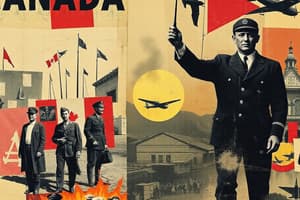Podcast
Questions and Answers
Which event described the emergence of new nation-states from the dismantling of European colonial empires?
Which event described the emergence of new nation-states from the dismantling of European colonial empires?
- The Cuban Missile Crisis
- Decolonization (correct)
- The Berlin Blockade
- The Marshall Plan
What was a key event in the Civil Rights Movement that involved Martin Luther King Jr. giving his 'I Have a Dream' speech?
What was a key event in the Civil Rights Movement that involved Martin Luther King Jr. giving his 'I Have a Dream' speech?
- The 1963 March on Washington (correct)
- The Montgomery Bus Boycott
- The Civil Rights Act passage in 1964
- The Cuban Missile Crisis
In which period did the United Nations Charter get adopted?
In which period did the United Nations Charter get adopted?
- Globalization
- Decolonization
- World War II (correct)
- Cold War
Which process involved increasing interconnectedness among countries driven by trade, investment, and communication technology?
Which process involved increasing interconnectedness among countries driven by trade, investment, and communication technology?
Which event marked the independence of Algeria in 1962?
Which event marked the independence of Algeria in 1962?
What was the purpose of the Montgomery Bus Boycott?
What was the purpose of the Montgomery Bus Boycott?
What was a significant outcome of World War II?
What was a significant outcome of World War II?
Which event marked the beginning of the Cold War?
Which event marked the beginning of the Cold War?
What was a key feature of the Civil Rights Movement?
What was a key feature of the Civil Rights Movement?
Which superpowers were involved in the Cold War rivalry?
Which superpowers were involved in the Cold War rivalry?
What major global shift is associated with the process of decolonization?
What major global shift is associated with the process of decolonization?
Which event is seen as a catalyst for the dawn of Globalization in the 20th century?
Which event is seen as a catalyst for the dawn of Globalization in the 20th century?
Flashcards are hidden until you start studying
Study Notes
Shaping Modern History: World War II, Cold War, Decolonization, Civil Rights, Globalization
tracing back the tapestry of the 20th century, we unravel a complex intertwining of events that have profoundly shaped our world. This chronological narrative spans from World War II, the Cold War, the process of Decolonization, the Civil Rights Movement, to the dawn of Globalization.
World War II (1939-1945)
World War II was a cataclysmic conflict born from the ashes of the First World War, with its roots in the rise of fascism, militarism, and imperialism. The war led to the fall of the Third Reich, the end of European colonial powers, and the beginning of the superpower rivalry between the United States and the Soviet Union.
Key events:
- The invasion of Poland by Germany in 1939
- The Holocaust, the systematic killing of 6 million Jewish people
- The dropping of atomic bombs on Hiroshima and Nagasaki in 1945
Cold War (1947-1991)
The Cold War was a period of geopolitical tension between the Western powers, led by the United States, and the Eastern powers, led by the Soviet Union. The rivalry between these global superpowers dominated international relations for almost half a century, with the threat of nuclear war hanging over the world.
Key events:
- The Marshall Plan, an American initiative to rebuild Europe
- The Berlin Blockade, a Soviet attempt to isolate West Berlin
- The Cuban Missile Crisis, a 13-day confrontation between the US and the USSR
Decolonization (1940s-1970s)
Decolonization, also known as the "wind of change," described the emergence of new nation-states from the dismantling of European colonial empires. The process involved the transfer of power from the colonial rulers to the native populations, often facilitated by the circumstances of World War II.
Key events:
- The adoption of the United Nations Charter in 1945
- The independence of India and Pakistan in 1947
- The declaration of the independence of Algeria in 1962
Civil Rights Movement (1950s-1960s)
The Civil Rights Movement was a struggle for equality and justice for African Americans and other marginalized groups in the United States. The movement spanned more than a decade and resulted in significant legislative and social changes.
Key events:
- The Montgomery Bus Boycott (1955-1956)
- The 1963 March on Washington for Jobs and Freedom, where Martin Luther King Jr. gave his famous "I Have a Dream" speech
- The passage of the Civil Rights Act in 1964 and the Voting Rights Act in 1965
Globalization (1970s-Present)
Globalization is a complex and ongoing process characterized by increasing interconnectedness among countries, driven by the growth of trade, investment, and communication technology. The globalization era has seen the rise of multinational corporations, the emergence of new economic powerhouses, and the continued spread of information and ideas.
Key events:
- The founding of the World Trade Organization in 1995
- The advent of the internet and the World Wide Web in the 1990s
- The growth of emerging economies, particularly China and India, in the 21st century
Each of these historical periods and events interweaves with the others, shaping the world in which we live and laying the foundations for our collective future. As we delve into the past, we gain insights and perspectives that inform our present and guide our decisions for tomorrow.
Studying That Suits You
Use AI to generate personalized quizzes and flashcards to suit your learning preferences.




